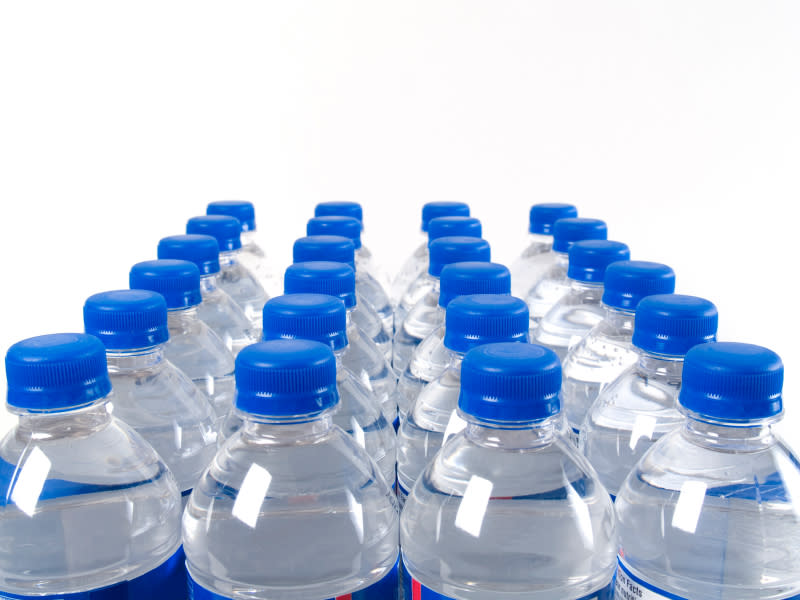 Daily Brew
Daily BrewShould tap water still be free in Canadian bars and restaurants?

Most water bottles are made of a plastic called polyethylene terepthalate, or PET. There are two problems with PET bottles. Problem 1: They take a boatload of crude oil to produce. University of Louisville researchers estimate that around 17 million barrels of oil are used each year to produce PET water bottles-a major reason why bottled water costs roughly four times as much as gasoline. Problem 2: We're chucking our water bottles in the trash, instead of the recycling bin. According to the Container Recycling Institute, nearly 90 percent of the 30 billion PET water bottles we buy annually end up in landfills-a huge problem when you consider that PET bottles take from 400 to 1,000 years to decompose. The bottom line: We should all take a cue from environmentally conscious activists like the folks at the University of Vermont-which recently banned bottled-water sales on campus-and opt for the tap whenever possible.
The idea of drinking tap water has become a bizarre thought to some, those bottled water-loving folks who are happy to pay a few dollars for peace of mind.
And paying for steak when you have a cow at home may appeal to some, we surely are not at a point where refusing tap water to restaurant or bar patrons is considered reasonable. Are we?
CBC News in Halifax recently studied the availability of drinking water in 25 downtown bars and found that four establishments outright refused to give patrons a glass of water, instead demanding they purchase a $2.75 bottle of H2O.
Question of intoxication aside – is it really a good idea to refuse water to someone downing shots of tequila? – the study raises a terrifying question: Is clean drinking water no longer considered an inalienable right?
Is it now unreasonable to expect access to free, clean water in Canada?
In the Halifax case, it clearly comes to a question of economics – why give away for free what you could profit from? But the survey is just one small indication that Canada has gone bottled-water crazy.
[ Related: Ontario raises minimum wage to $11 an hour, the highest in the country ]
Toronto has for years banned bottled water sales on city property, but despite college campuses and other major cities (such as San Francisco) moving in that direction, Mayor Rob Ford has vowed to overturn the ban and get the water train rolling again.
The bottled-water industry, meantime, has been having a field day in Canada. A Nestlé plant in Hope, B.C., has had years of free access to ground water in the province, pumping some 265 million litres annually from an aquifer that also supplies the town's 6,000 residents. The company also just recently agreed to limit its water-bottling operations in Ontario during times of drought, ended an extended battle with environmentalists.
The frustrating turn is that Canadian tap water is among the world's best. Save for remote communities or the occasional boil-water advisory (to be fair, there are more than you'd expect), water from the kitchen tap is treated, monitored and safe to drink.
Yet Canadians buys hundreds of millions of bottled-water units every year. A York University study finds Toronto consumes 100 million bottles a year, while a Toxic Free Canada report determined that 478 million bottles were sold in B.C. in one year.
Bottled water costs more, is more wasteful and uses more oil and energy to produce than tap water.
[ More Brew: First openly gay commander for Alberta Mounties shows how far the RCMP has come ]
The Council of Canadians has even concluded that bottled water, occasionally just re-filtered tap water, isn’t necessarily any safer or healthier than your average drinking water. Food inspection standards require bottled water facilities to be tested once every three years, while tap water is tested continuously.
While other countries struggle for access to clean water at all, we turn our noses up at the free stuff flowing from the taps in our homes, restaurants and bars. And when we do want tap water, there are those who would seek to profit.
Water isn’t something bars and restaurants should expect to profit from. Paying customers, even the occasional straggler off the street, should expect access to the liquid flowing from the taps. They shouldn’t be forced into the clutches of the bottled water industry against their will.

 Yahoo Sports
Yahoo Sports 
